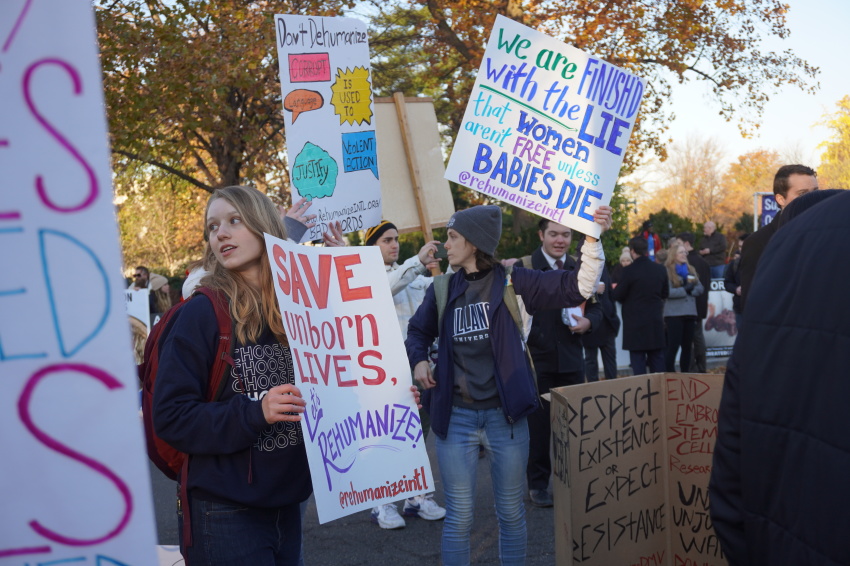Missouri lawmakers, activists file lawsuit to invalidate abortion ballot measure

A new lawsuit seeks to disqualify a ballot measure that would establish a right to abortion in the Missouri Constitution as several states will give their voters an opportunity to weigh in on abortion this fall.
In a statement posted on Facebook Friday, Missouri State Rep. Hannah Kelly announced the filing of a lawsuit seeking to invalidate Missouri's Amendment 3. Filed in Cole County Circuit Court, Kelly was joined as plaintiffs by her fellow Republican state legislator Sen. Mary Elizabeth Coleman, pro-life activist Kathy Forck and maternity home director Peggy Forrest.
The plaintiffs contend Amendment 3 would "open the door for taxpayers to pay for abortion and gender transition surgery" and "rob Missourians of their right to justice if a healthy baby is lost or a healthy mother is harmed or injured due to negligence during pregnancy, labor, or delivery."
"Amendment 3 is a direct threat to the lives of Missouri women by erasing the will of voters who chose to protect the safety of women and the child by electing strong pro-life leaders," the plaintiffs asserted in a joint statement. "We are united in our fight against this insidious amendment that seeks to enshrine the brutal practice of abortions even in the 7th, 8th or 9th months of pregnancy."
The lawsuit argues the amendment's use of the phrase "reproductive freedom" violates the single-subject rule for state constitutional amendments.
The complaint characterized the phrase as "unlimited in scope," expressing concern that it would end up "systematically neutralizing all laws, existing or future, that attempt to limit this new, limitless 'right to reproductive freedom.'"
The text of Amendment 3, as compiled by the Missouri Secretary of State's Office, states, "The Government shall not deny or infringe upon a person's fundamental right to reproductive freedom."
The measure defines "reproductive freedom" as "the right to make and carry out decisions about all matters relating to reproductive health care, including but not limited to prenatal care, childbirth, postpartum care, birth control, abortion care, miscarriage care, and respectful birthing conditions."
The proposed amendment adds that "the right to reproductive freedom shall not be denied, interfered with, delayed, or otherwise restricted unless the Government demonstrates that such action is justified by a compelling governmental interest achieved by the least restrictive means."
"Any denial, interference, delay, or restriction of the right to reproductive freedom shall be presumed invalid," the proposed constitutional amendment states.
The measure would allow the state to regulate abortions after the point of fetal viability, defined as "the point in pregnancy when, in the good faith judgment of a treating health care professional and based on the particular facts of the case, there is a significant likelihood of the fetus's sustained survival outside the uterus without the application of extraordinary medical measures."
The proposed constitutional amendment includes a caveat that abortions can take place after fetal viability if a medical professional determines that they are necessary to "protect the life or physical or mental health of the mother." If passed, Amendment 3 would nullify current Missouri law, which bans abortions in almost all circumstances.
More recent public opinion polling sampling voter sentiment toward Amendment 3 is limited.
However, a February survey of 900 likely Missouri voters conducted by St. Louis University and YouGov found that 44% of respondents intended to support Amendment 3 while 37% planned to oppose it. The measure must secure the support of a majority of Missouri voters in order to pass.
Missouri is one of several states where voters are expected to have the opportunity to weigh in on abortion policy at the ballot box this fall. Additional states with similar measures on the ballot include Arizona, Colorado, Florida, Maryland, Montana, Nebraska, Nevada, New York and South Dakota.
The push to establish a right to abortion in state constitutions has picked up steam following the U.S. Supreme Court's 2022 Dobbs v. Jackson Women's Health Organizationdecision, which determined that the U.S. Constitution does not contain a right to abortion and enabled states to implement laws prohibiting most or nearly all abortions.
Voters in California, Michigan and Vermont approved measures establishing constitutional rights to abortions in their respective states in 2022 while Ohio did the same in 2023.
Ryan Foley is a reporter for The Christian Post. He can be reached at: ryan.foley@christianpost.com



























